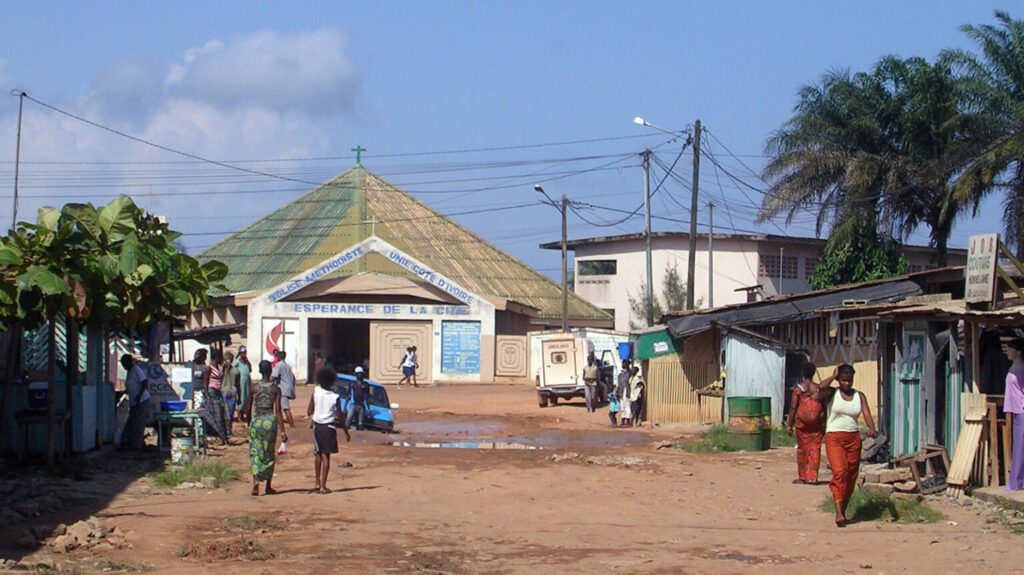NAIROBI, Kenya (RNS) — After the United Methodist Church allowed its clergy to marry same-sex couples and lifted its ban on ordination of LGBTQ clergy, Methodists in Ivory Coast became the first annual conference to leave the 9.9 million-member denomination, even as other African conferences have emphasized their ties with the U.S. church.
A United Methodist church, rear, in San Pédro, Ivory Coast. (Photo by Axe/Wikipedia/Creative Commons)
The Ivorian annual conference, as the UMC’s geographical jurisdictions are known, said the decisions made at the April 23-May 3 United Methodist General Conference in Charlotte, North Carolina, reflected current cultural and social values rather than biblical ones.
Bishop Benjamin Boni, the president of the annual conference, accused the United Methodist Church of sacrificing its integrity and charged that the denomination had distanced itself from Scripture, thereby making the UMC no longer suitable for the Ivorian conference.
The Ivorian conference, “for reasons of conscience, before God and before his word, supreme authority in matters of faith and life, decides to leave the United Methodist Church denomination,” Boni said in a statement after the annual conference’s extraordinary session on May 28 in Cocody, a suburb of the capital, Abidjan.
The United Methodist Church has deep roots in West Africa. In 1914, William Wade Harris, a Liberian evangelist, promoted Methodism in what was then the French colony of Cote d’Ivoire. (Harris, who later belonged to the American Episcopal Mission, also left a legacy of Harrist churches, which practice a syncretic mix of traditional African and Christian faith.)
Ivory Coast, red, in western Africa. (Image courtesy of Wikipedia/Creative Commons)
After the formation of the United Methodist denomination in 1968, the conference became autonomous in 1985, at the same time as other African annual conferences that had European and American roots.
While the Ivorian conference’s decision chops off at least 1 million Methodists from the UMC, all other annual conferences in Africa have maintained their links with the U.S. denomination.
“This is a matter of one denomination,” said the Rev. Martin Mujinga, the general secretary of the Africa Methodist Council, a pan-African association of Methodist, Wesleyan, and United and Uniting churches.
At the African Methodist Council Summit in Lagos, Nigeria, May 29-June 2, said Mujinga, the question of how to respond to the UMC’s changes to its rules on LGBTQ matters “was discussed in passing. We did not want the issues of one denomination to crowd discussions of others.”
Some UMC clergy and church leaders admit to some sleepless nights, however.
The Rev. Paul Matumbi Muthuri, a former Kenyan Methodist bishop, said that while most Methodist conferences, including Kenya’s, run independently, they have grown together as a family, sharing mission and development projects, most notably Kenya Methodist University, a collaborative effort by the U.S. church and the Kenya annual conference dating to the mid-1990s. Scholarships from American annual conferences have also provided training and other resources for Kenyan clergy.
“You don’t throw away the relationship of your sibling because you do not agree on an issue,” Muthuri told Religion News Service. “We are treading very carefully on this matter because of our history and the way we have done our mission. We have so much to cherish as a family. The value for brother and brother respect is so big.”
The former bishop believes dialogue can solve the disagreements over LGBTQ issues and normalize the relationships among the churches. “We have struggled with bigger things, and the church has always triumphed,” he said.
Some Kenyan officials say the conference will take a final decision about how to respond to the U.S. church at its annual meeting in August. But Muthuri explained that the African church has yet to confront LGBTQ clergy in its own ranks. “You can hear one, two, three cases of clergy practicing secretly,” he said, referring to gay ministers, “although they have not come out boldly to declare their stand.”
Source link : https://wordandway.org/2024/06/05/ivory-coast-splits-with-umc-but-kenya-and-other-african-conferences-slow-to-follow/
Author :
Publish date : 2024-06-05 15:09:52
Copyright for syndicated content belongs to the linked Source.
